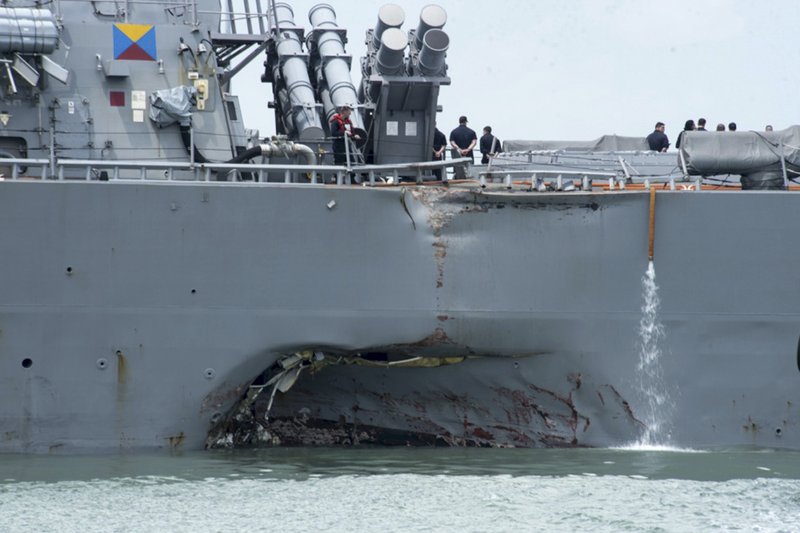WASHINGTON -- A senior U.S. Navy officer told a congressional oversight panel Thursday that the hectic pace of military operations and a constrained military budget don't excuse two warship accidents in the Pacific region that killed 17 American sailors and led the service to order a broad investigation into its performance and readiness.
"No matter how tough our operating environment, or how strained our budget, we shouldn't be and cannot be colliding with other ships and running aground," Adm. William Moran, the vice chief of naval operations, told members of the House Armed Services Committee. "That is not about resourcing; it is about safety and it is about leadership at sea."
Moran said the Navy is "shocked" by the collisions involving the USS John S. McCain in August and the USS Fitzgerald in June.
Ten sailors aboard the McCain destroyer were declared missing after the ship crashed into a Liberian-flagged oil tanker in coastal waters off Singapore. Seven sailors died when another destroyer, the Fitzgerald, hit a container ship off Japan.
John Pendleton of the Government Accountability Office said the Navy is "treading water" in a push to keep up with operational demands that have strained the military branch. Pendleton said the office found that more than a third of the warfare certifications for cruiser and destroyer crews based in Japan, including certifications for seamanship, had expired as of June. That represents "a more than a fivefold increase in the percentage of expired warfare certifications for these ships" over the past two years, Pendleton said.
Overall, four Navy vessels have been involved in accidents this year in the Pacific.
The 7th Fleet's commander was relieved of duty shortly after the McCain crash. Adm. Scott Swift, commander of the U.S. Pacific Fleet, said he'd relieved Vice Adm. Joseph Aucoin, a three-star officer, "due to a loss of confidence in his ability to command."
A month before the Fitzgerald accident, a South Korean fishing boat collided with the USS Lake Champlain guided-missile cruiser off the Korean Peninsula while it was operating in the western Pacific as part of the 3rd Fleet's USS Carl Vinson aircraft carrier strike group. No one was injured in the May 9 incident.
On Jan. 31, the USS Antietam guided-missile cruiser ran aground near the Yokosuka base that is the home port for the 7th Fleet, damaging its propellers and leaking about 1,100 gallons of hydraulic fuel into Tokyo Bay. The ship's commander was relieved from duty.
Although the Defense Department has a budget of just over $600 billion for the 2017 budget year, senior military officials have repeatedly argued that more money is needed to halt an erosion in the military's readiness for combat. They want Congress to repeal a 2011 law that set strict limits on military spending and forced a reduction in the number of ready-to-fight combat units.
Moran said the Navy's operational demands continue to grow even though its fleet has shrunk dramatically.
A Section on 09/08/2017
